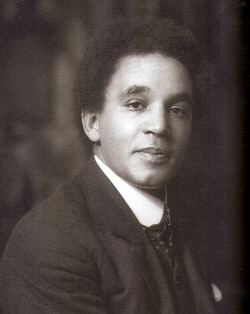Two musical events of special interest will begin Maine’s summer festival season.
The first will be a special preview of a work by British composer Samuel Coleridge-Taylor. Reconstructed by Longfellow Chorus artistic director Charles Kaufmann, it will be premiered June 2 at Ludke Auditorium of the University of New England.
The in-the-round performance of the forgotten work, a piece for violin and piano based on the spiritual “Keep Me from Sinking Down,” will be by the Longfellow Chorus Orchestra and Lydia Forbes, violinist of the DaPonte String Quartet.
The event will be a rehearsal for a private filmed performance on June 4 in Norfolk, Conn., where the premiere was given in 1912 by American violinist Maud Powell. The filming is part of the Longfellow Chorus Coleridge-Taylor Documentary Project. Tickets are $10. For details, visit longfellowchorus.com/Maud.html.
Coleridge-Taylor (1875-1912) was a renowned and prolific composer whose successful career was launched by his immensely popular cantata “Hiawatha’s Wedding Feast,” a setting of the famous poem by Maine’s own Henry Wadsworth Longfellow.
Named (most confusingly) for British poet Samuel Taylor Coleridge, he also set many of Longfellow’s other poems and translations to music, including “The Quadroon Girl,” which describes a plantation owner selling his own mixed-race daughter into slavery. Not a subject that comes to mind immediately when thinking of Longfellow.
Coleridge-Taylor made three successful tours of the United States, during which he became known as “the black Mahler.”
He was no shrinking violet. Of his “24 Negro Melodies” for piano, he said: “What Brahms has done for the Hungarian folk music, Dvorak for the Bohemian and Grieg for the Norwegian, I have tried to do for these Negro melodies.”
The second event will be the opening concert of the Portland String Quartet’s two-week workshop at Saint Joseph’s college, on July 16 at Viola George Auditorium. Visit portlandstringquartet.org for information.
It will include the String Quartet in D Major Op. 76, No. 5, of Haydn; Schubert’s String Quartet in D Minor, “Death and the Maiden”; and a duo for violin and viola by Laszlo Weiner, a victim of the Holocaust.
A prodigy as pianist, conductor and composer, and a student of Zoltan Kodaly in Budapest from 1934 to 1940, Weiner’s playing and the performance of his works were restricted by anti-Jewish laws. He died at age 28 in the Lukov labor camp in 1944.
According to Julia Adams, violist of the PSQ, the duo demonstrates the profound influence of Kodaly, plus Weiner’s “own mastery of classical form and the electrifying back-and-forth dialogue between the two instruments.”
It will be played by Adams and her niece, Mary Ellen Woodside, a principal in the Tonhalle Orchestra Zurich and a noted chamber music player in her own right. Woodside, who lives in Switzerland with her husband, cellist Rafael Rosenfeld, and their daughter, is filling in for Stephen Kecskemethy, who is unable to play because of illness.
Christopher Hyde is a writer and musician who lives in Pownal. He can be reached at classbeat@netscape.net.
Send questions/comments to the editors.



Success. Please wait for the page to reload. If the page does not reload within 5 seconds, please refresh the page.
Enter your email and password to access comments.
Hi, to comment on stories you must . This profile is in addition to your subscription and website login.
Already have a commenting profile? .
Invalid username/password.
Please check your email to confirm and complete your registration.
Only subscribers are eligible to post comments. Please subscribe or login first for digital access. Here’s why.
Use the form below to reset your password. When you've submitted your account email, we will send an email with a reset code.